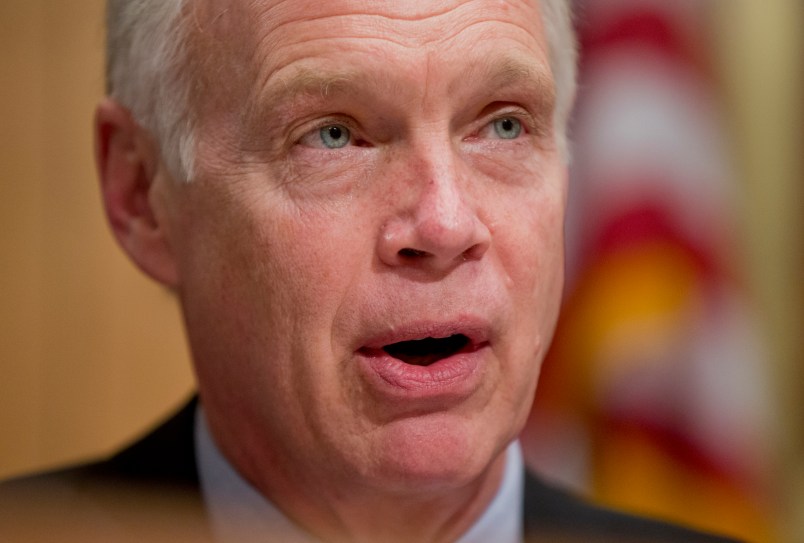Additional reporting by Cameron Joseph
Sen. Ron Johnson (R-WI) said the extended, tense-looking conversation he had with Majority Leader Mitch McConnell (R-KY) on the Senate floor Tuesday while withholding his vote to move forward with Obamacare repeal was about him being a “positive influence” and denied that it was heated.
McConnell’s top deputy, Sen. John Cornyn (R-TX), who participated at times in the mystery huddle, said Johnson had some “objections” and “frustration” about the process.
For more than five minutes, Johnson and McConnell engaged in a private back-and-forth as Johnson’s vote remained uncast on a key procedural vote to advance a yet-to-be-determined Obamacare repeal bill — a vote that could have killed or kept alive the effort. McConnell at one point threw up his hands in seeming frustration. The suspenseful conversation ended when Sen. John McCain (R-AZ) returned to the floor for the first time since his cancer diagnosis to a standing ovation. He and Johnson cast the votes to create a tie that Vice President Mike Pence broke to put the GOP over the top and proceed to debate on the legislation.
Heading into the Senate chamber before the vote, Johnson wouldn’t tell TPM how he planned to vote on the motion to proceed, saying only cryptically that he needed to go “talk to the leader.”
He did vote in favor of advancing the legislation after all, and played coy after the vote when reporters ask if that was his plan before his discussion with the McConnell.
“You always have your options,” he said.
Asked repeatedly about what their conversation was about, Johnson would only say that he wanted to “express” to McConnell that he “wanted to be a positive influence and provide as much positive input into a better result.”
He also admitted that seeing McCain show up in the chamber a yes vote made it harder for him to vote no.
“That would have been a pretty tough no vote,” Johnson said
“I was happy to join Senator McCain,” he added.
Johnson has been a thorn in Senate GOP leadership’s side as it sought to cobble together a consensus repeal bill. He joined three conservatives in rejecting the first version of the Senate Obamacare replacement, the Better Care Reconciliation Act. He has complained repeatedly about the slap-dash process Republicans have used to go forward, culminating in Tuesday’s vote to open debate on a bill, despite Republicans not really knowing what that bill will look like.
Cornyn, asked by reporters later, painted a slightly less rosy picture of what Johnson’s conversation was really about.
“Well, Senator Johnson, like others, has had some objections to the process, which is admittedly cumbersome, because you’re getting no Democratic cooperation, you have to do it under the budget reconciliation rules, so it’s frustrating for everybody,” Cornyn said. “Some of it’s frustration. But I’m glad he voted to proceed to the bill, and look forward to working with him.”







More “Profiles in Courage” from the GOP: Special Victims Unit.
Yep, old Ron “Albino” Johnson was positive that anything the GOP could come up with wouldn’t be nearly cruel enough.
wanted to be a good influence, like tRUmp being a role model for the scouts
There are better ways to be a good influence than being a Republican shit-head fuck-your-constituents-over dick, I should think.
I just listened to McCain’s speech. It makes their vote all the more disgusting. When McCain made the comment about doing work “for the public good” it made me want to throw this Android right out the fucking window.
Johnson can shove his “positive influence” up his own ass.